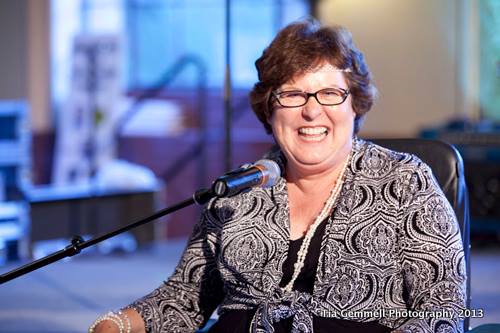My mom loved the microphone and the stage. She appreciated the opportunity to educate and encourage others en masse. In this blog, she shares her speech at the ALS Gala Fundraiser. She was very thankful for the opportunity.
–Tricia
Last night I had the privilege to speak at the ALS Gala Fundraiser, my part of the program was to pay tribute to the ALS Association and the wonderful work they do in the Greater Sacramento area. My blog is a little longer than I usually write, but I am posting my speech to give those interested more information about the Association’s services to the ALS community.
Hi, my name is Susan, and I have ALS. As in any 12-step program, you have to start by naming your disease, being able to accept the diagnosis, and having a plan for moving forward. ALS is no different. Thank you for inviting me to be here tonight to represent other ALS patients that benefit from your support and encouragement as they move forward.
My talk tonight aims to recognize the ALS Association and its impact on the ALS community, particularly the greater Sacramento area.
Each month, when the ALS support group meets, I try to make it a point to tell Nancy and Nancy how much I appreciate them and the outstanding work they do in this community. I know my life and Cliff’s are much better because of their support.
Let me tell you how they have helped us. When first diagnosed in August 2011, like most everyone else, we were scared to death. A few days after my diagnosis, I emailed my boss stating that I had been diagnosed with ALS and would either become a famous baseball player like Lou Gehrig or be the subject of a book, Tuesdays With Morrie.
In October that year, we took a road trip to Kalispell, Montana, to visit close family. Crying my way through most of the trip, I thought everything I ever knew about the disease would happen to me while I was in Montana. I thought I wouldn’t be able to walk, talk, breathe, or swallow, but most importantly, I would not be able to spend time with my daughter.
Obviously, I did not die on the trip, and I do spend time with my daughter. But Cliff and I had some serious decisions to make and were not exactly sure where to turn, but we met Nancy Wakefield at the clinic at UC Davis, where she introduced us to the ALS Association and some of the services they provide.
Not knowing where to turn, we contacted the Association for possible referrals for financial planning, wills, trusts, insurance etc.…
What was interesting, I called them, thinking this is safe. I am not getting involved; I don’t want to go to meetings; I don’t want to see what those other ALS people are going through; I don’t want to deal with this because I am going to be different; stronger; more positive; more informed; all on my own. It didn’t work. ALS cannot and should not be done alone.
Let me tell you about the Association, but more importantly, let me tell you about the people. This chapter is no different from many others, but the people make the difference.
This team provides resources, education, and support for the patient, family, and friends with love, sensitivity, and graciousness.
As I mentioned, our first experience was needing resources in the community for the paperwork part of our lives. Shortly afterward, we were planning a road trip to Oklahoma, knowing they had an equipment loan closet. On a whim, I called the office and asked about a Go-Chair. I was still struggling with a walker then, hesitant to take more than three steps because of the fatigue.
“Sure, come by and pick it up,” is what I was told. I used the Go-Chair for almost a year before being upgraded to my power wheelchair.
Over the past year, I have borrowed, at no expense, in addition to the Go Chair, a shower chair, a raised toilet seat, ramps for getting into my house, and a transfer board. Adding to the physical resources available through the closet, we have also been beneficiaries of current ALS information. If they don’t know the answers, they help us find them. Books, tapes, and contacts are all part of their information reservoir.
The lines get a little blurred between education and support; it all goes together. Between all of the staff, they attempt to stay current on research, trials, available technology, and new medical procedures in place. This is provided with the utmost sensitivity, care, and understanding of a challenging disease.
Resources, education, and support…if I were to rate them on a scale of one to ten, I would rate support as a ten, with ten being the highest. It takes caring, compassionate, smart people to make this work.
Support comes in many forms, just one of them being Premier Medical. I have spent more time in my bathroom with Brian than with any man other than my husband.
He graciously does not comment on the many dings, marks, or scrapes on the walls and doorways caused by misguided power equipment. Brian has delivered and picked up loans from the equipment closet, but a serious day was when he delivered the Power Wheel Chair. I was on the verge of a meltdown, but because of his good humor, caring, and concern, we got through the time okay, as difficult as it was for me to acknowledge another major example of the disease.
The Saturday support group, the one we didn’t want to be part of, the one we were going to stay away from because we did not want to see what would happen in the future, has become something we look forward to. Not because it is easy or necessarily comfortable but because it is safe and supportive, educational and informative, and where you can ask and receive honest, direct answers.
Think about it, where else can you go and talk about how to pull up your pants, where someone will lift their shirt and show you their feeding tube, or talk about the fears of having a trach or going on a ventilator? It only works because this great staff of people makes it work.
As I said in the beginning, the first step is acknowledging the disease, saying it aloud, and developing a plan. The ALS Association and the people affiliated with it make it work, each of them I personally want to say thank you for making this difficult journey a little easier.
Thank you, ALS Association.
–Susan
[/et_pb_text][/et_pb_column][/et_pb_row][/et_pb_section]

